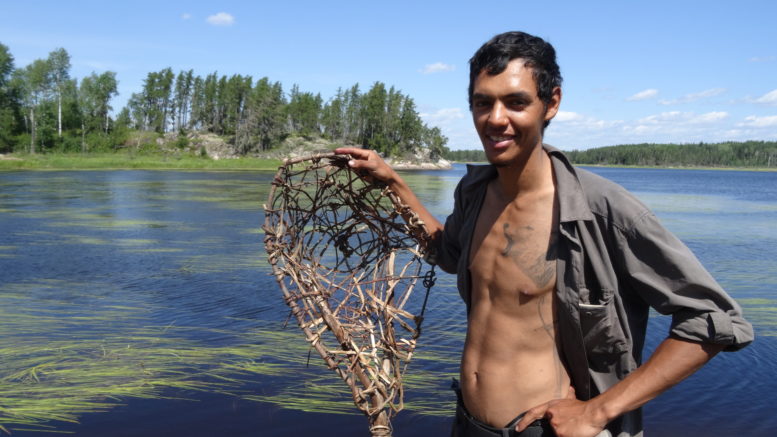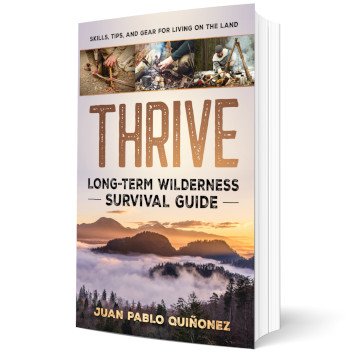Before setting out with my partner to live 6 months in the boreal forest, I didn’t reflect much about the effects starvation would have on us. Being food deprived would end up completely influencing our minds, bodies and our survival strategy. If you are interested in long term outdoor survival it is very important to learn about starvation. Most people have no idea what chronic starvation feels like and how it affects you; I’ll assure you that every wilderness skill or activity is affected. One thing is to portage a 70 lbs canoe when just a week ago you were in civilization eating anything you want, and were well rested. And a very different thing is to portage a 70 lbs canoe after months of being food deprived.
Cold
I’ve read some survival blogger’s opinions of the Alone TV Show. One of them saw a contestant wearing many warm clothes and wrote: “I hear him saying he is cold out on the water, yet see him wearing about six layers of clothing…. I would be having a heat stroke”. What he doesn’t realize are the effects of starvation. Being months without enough food made my metabolism efficient in order to preserve energy, and made me loose 30 lbs. Having less weight and a slow metabolism meant that my body had less natural insulation and it was producing less heat in order to conserve calories. I ended up wearing all my warm “winter’ clothes in September.
Another popular blogger wrote of the contestants: “they couldn’t do what any self respecting backpacker can accomplish without even a second thought” talking about the difficulty the contestants had camping without a fire (some couldn’t start a fire for a few days) in the coast of British Columbia. But long term wilderness survival is all about energy. And energy conservation is extremely important. If you are backpacking you can just keep hiking amidst the rain to keep warm. Or you can just endure the cold, after all, you’ll be in a warm house in a few days. You don’t have those luxuries if you are in a long term scenario. The importance of a fire lies in that you don’t want to use up your calories to keep your body warm when you can use the energy stored in wood for the same purpose.
Lack of Energy
Another important effect is not having the physical strength or even the will to do stuff. After months without enough calories our bodies forced us to really slow down. Someday we wanted to just sit by the fire and don’t do anything, and we did just that. We joked around that we had aged and were now 80 years old. Our energy levels really went down the drain after long periods of food deprivation.
In the first weeks of our adventure we made a long list of all the things we wanted to accomplish. By the end of the third week we started scratching out what we felt wasn’t absolutely necessary. After our bodies realized they weren’t getting enough energy they began to shut down. We ended up not doing most of them. Everything had become more strenuous, even sitting. We started to analyze every activity to see if there was an easier way to do it that required less energy. We also made sure we only invested our energy if we were going to gain or preserve energy.
Food Obsession
We were constantly craving and thinking about food. We had a rule not to talk about food from civilization. We could only talk about food that we could gather from the wild, and we constantly dreamt about food. Before going to sleep we visualized what we would bake with our flour ration the next morning. This constant obsession forced us into being more mindful when eating and to appreciate every bite. Food will probably be the main challenge of any voluntary long term wilderness adventure. Isolation, and shelter/clothing will be other important challenges as well.
An upside to this food obsession is that you will be more willing to try things you might deem disgusting when well fed. The worst thing I tasted during our adventure was a sac of fish urine. I was just trying out parts of the fish and thought that that sac might be some kind of oil; anyway, I was not afraid to try strange things.
Mind
My mind became very active. It was probably a survival mechanism; I constantly brainstormed at night, when I couldn’t sleep, about ways to catch more fish. Our bodies needed more calories and they gave us the mental energy to figure out ways to improve our chances.
What does this mean for your strategy?
There will hopefully be two main phases of your long term wilderness survival scenario. You will loose fat very quickly in the first phase and in the second phase you want to stabilize or increase your weight. In the field, you must quickly race against time and find a strategy to have a constant supply of food before your body wears down. This means that you should start trapping food early on and modify the traps quickly when you still have lots of energy. You shouldn’t expend energy like crazy, but you should not waste time. Every day that you are loosing weight will make you more fatigued and will make it harder to do anything.
How can you prepare for this?
There are two main ways of preparing for this challenge. You should be well versed with the method of gathering your most consistent and dependable food staple, which would probably be fish. The second way for counteracting the weight loss phase is to start your wilderness immersion at a time of abundance.
Ideally, you should practice your method of procuring fish and perfect it in similar conditions before embarking into the wild. That way you will have a shorter time figuring out how to get a consistent catch once you are there. And it will be easier to get into the stabilizing or increasing weight phase.
It is hard to choose the perfect time to go into the wilderness for a long term survival adventure. You must make a compromise between going at a time of abundance and having enough time to gather wild food for the winter (depending on your latitude and how long you’ll be there). For example If I were going to spend a year in the boreal forest without rations I may start during berry season and gather as much berries as I could while focusing on trapping lots of fish. Then I would continue gathering and preserving extra fish for the winter while I focus on building a winter shelter. When wild rice season comes I will still have enough energy to harvest as much rice as I need for the rest of the year.
Or I could start a week or two before the wild rice harvest in order to gather the maximum amount possible of rice and then ration it throughout the year. In my bio region fish and wild rice would be the most important staples. Moose and berries would be the second most important staples.
Wrap up
Your long term wilderness survival strategy must be focused on stabilizing your weight as soon as possible. You should rehearse your food gathering methods and choose good timing for the start of your adventure. You will experience a lack of energy, you will feel tired, and you will feel much colder if you remain food deprived.


